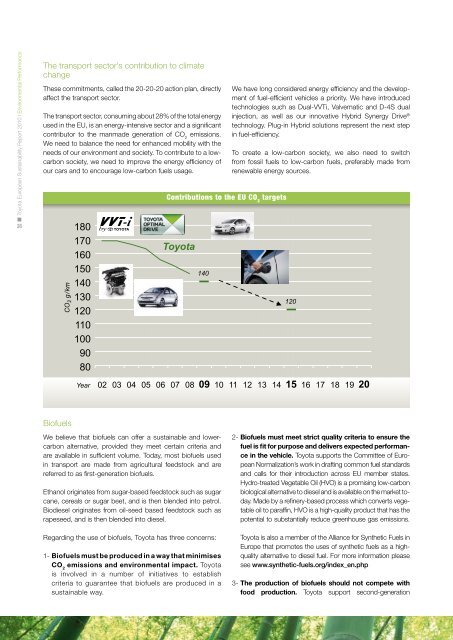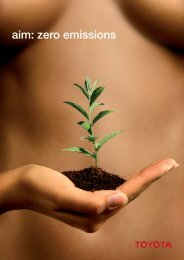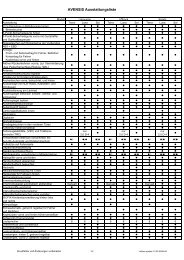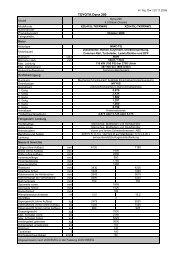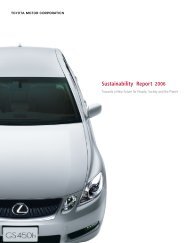Download full report - Toyota Motor Europe
Download full report - Toyota Motor Europe
Download full report - Toyota Motor Europe
You also want an ePaper? Increase the reach of your titles
YUMPU automatically turns print PDFs into web optimized ePapers that Google loves.
<strong>Toyota</strong> <strong>Europe</strong>an Sustainability Report 2010 I Environmental Performance<br />
28<br />
The transport sector’s contribution to climate<br />
change<br />
These commitments, called the 20-20-20 action plan, directly<br />
affect the transport sector.<br />
The transport sector, consuming about 28% of the total energy<br />
used in the EU, is an energy-intensive sector and a significant<br />
contributor to the manmade generation of CO 2 emissions.<br />
We need to balance the need for enhanced mobility with the<br />
needs of our environment and society. To contribute to a lowcarbon<br />
society, we need to improve the energy efficiency of<br />
our cars and to encourage low-carbon fuels usage.<br />
CO 2 g/km<br />
Biofuels<br />
180<br />
170<br />
160<br />
150<br />
140<br />
130<br />
120<br />
110<br />
100<br />
90<br />
80<br />
<strong>Toyota</strong><br />
140<br />
We have long considered energy efficiency and the development<br />
of fuel-efficient vehicles a priority. We have introduced<br />
technologies such as Dual-VVTi, Valvematic and D-4S dual<br />
injection, as well as our innovative Hybrid Synergy Drive ®<br />
technology. Plug-in Hybrid solutions represent the next step<br />
in fuel-efficiency.<br />
To create a low-carbon society, we also need to switch<br />
from fossil fuels to low-carbon fuels, preferably made from<br />
renewable energy sources.<br />
Year 02 03 04 05 06 07 08 09 10 11 12 13 14 15 16 17 18 19 20<br />
We believe that biofuels can offer a sustainable and lowercarbon<br />
alternative, provided they meet certain criteria and<br />
are available in sufficient volume. Today, most biofuels used<br />
in transport are made from agricultural feedstock and are<br />
referred to as first-generation biofuels.<br />
Ethanol originates from sugar-based feedstock such as sugar<br />
cane, cereals or sugar beet, and is then blended into petrol.<br />
Biodiesel originates from oil-seed based feedstock such as<br />
rapeseed, and is then blended into diesel.<br />
Regarding the use of biofuels, <strong>Toyota</strong> has three concerns:<br />
1- Biofuels must be produced in a way that minimises<br />
CO 2 emissions and environmental impact. <strong>Toyota</strong><br />
is involved in a number of initiatives to establish<br />
criteria to guarantee that biofuels are produced in a<br />
sustainable way.<br />
Contributions to the EU CO 2 targets<br />
120<br />
2- Biofuels must meet strict quality criteria to ensure the<br />
fuel is fit for purpose and delivers expected performance<br />
in the vehicle. <strong>Toyota</strong> supports the Committee of <strong>Europe</strong>an<br />
Normalization’s work in drafting common fuel standards<br />
and calls for their introduction across EU member states.<br />
Hydro-treated Vegetable Oil (HVO) is a promising low-carbon<br />
biological alternative to diesel and is available on the market today.<br />
Made by a refinery-based process which converts vegetable<br />
oil to paraffin, HVO is a high-quality product that has the<br />
potential to substantially reduce greenhouse gas emissions.<br />
<strong>Toyota</strong> is also a member of the Alliance for Synthetic Fuels in<br />
<strong>Europe</strong> that promotes the uses of synthetic fuels as a highquality<br />
alternative to diesel fuel. For more information please<br />
see www.synthetic-fuels.org/index_en.php<br />
3- The production of biofuels should not compete with<br />
food production. <strong>Toyota</strong> support second-generation


